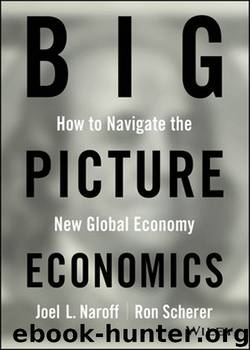Big Picture Economics: How to Navigate the New Global Economy by Ron Scherer & Joel Naroff

Author:Ron Scherer & Joel Naroff [Ron Scherer]
Language: eng
Format: epub
Publisher: John Wiley & Sons
Published: 2014-04-20T16:00:00+00:00
Braun figuratively scratches his head. “My question is, did the press release tell me at all why they did this? I've talked to the AOL executives and they say, ‘One of the biggest things we struggled with is have we overcomplicated this?’”
By way of contrast, he says the announcements from legendary investor Warren Buffett are quite simple. “Most of them are one sentence explaining why they made the acquisition,” he says. “They are extremely purposeful.”
As it turns out, overcomplication of the press release was the least of their problems. The merger is now considered a huge failure. AOL, for example, had a market value of only $2.7 billion in mid-2013. “I think the vision of it is very inspiring,” says Braun. “But the execution of it is the difficult part.”
However, looking back at the context of the merger, it becomes a little more understandable why the executives would call the new company “uniquely positioned” in their press release.
When the AOL–Time Warner merger was announced, the dotcom era was still in full swing, recalls Braun. He compares it to a modern-day gold rush. “These dot-coms were gold,” he says, “and no one knew where e-commerce was going.” This led to one of those periodic Wall Street buying panics. Mutual funds, hedge funds, and investors from Peoria all wanted a piece of the action.
“Companies were being bought who not only did not have any profits, they did not have any revenues because it really was a feeding frenzy where people said, ‘We don't know what's going on so consequently we better buy stuff or we are going to miss out.’”
To Braun, an element of negative context around the merger was the millennial shift. There were plenty of news reports questioning whether computers, phone systems, and other electronic devices would still work on January 1, 2000. He terms it an issue of bad timing—no pun intended—since it began to raise an element of doubt just when the mega-merger was in the works.
“Remember, people got up in the middle of the night to check to see if their phones worked, people took cash out of the bank in case there was chaos at the banks,” he says. “So there was this background of fear.”
Add in yet one other issue of context—there was also plenty of money around to invest in these types of deals. “As a result of that, it was a lot of the ‘other people's money’ phenomenon,” he says, referring to how deal makers used investor funds to enrich themselves.
But that was then. Does context still matter in the world of mergers and acquisitions? Indeed, it does, says Braun, who observes that some of the contextual issues include whether a company is in a position to take advantage of changes in the economy, whether it is a good time to borrow to do a deal or use cash, and whether it is a good time to enact a merger from a tax standpoint.
One example of how taxes matter to corporate buying and selling happened at the end of 2012.
Download
This site does not store any files on its server. We only index and link to content provided by other sites. Please contact the content providers to delete copyright contents if any and email us, we'll remove relevant links or contents immediately.
International Integration of the Brazilian Economy by Elias C. Grivoyannis(110753)
The Radium Girls by Kate Moore(12019)
Turbulence by E. J. Noyes(8040)
Nudge - Improving Decisions about Health, Wealth, and Happiness by Thaler Sunstein(7694)
The Black Swan by Nassim Nicholas Taleb(7111)
Rich Dad Poor Dad by Robert T. Kiyosaki(6613)
Pioneering Portfolio Management by David F. Swensen(6289)
Man-made Catastrophes and Risk Information Concealment by Dmitry Chernov & Didier Sornette(6007)
Zero to One by Peter Thiel(5789)
Secrecy World by Jake Bernstein(4742)
Millionaire: The Philanderer, Gambler, and Duelist Who Invented Modern Finance by Janet Gleeson(4469)
The Age of Surveillance Capitalism by Shoshana Zuboff(4279)
Skin in the Game by Nassim Nicholas Taleb(4240)
The Money Culture by Michael Lewis(4198)
Bullshit Jobs by David Graeber(4179)
Skin in the Game: Hidden Asymmetries in Daily Life by Nassim Nicholas Taleb(3993)
The Dhandho Investor by Mohnish Pabrai(3760)
The Wisdom of Finance by Mihir Desai(3735)
Blockchain Basics by Daniel Drescher(3574)
